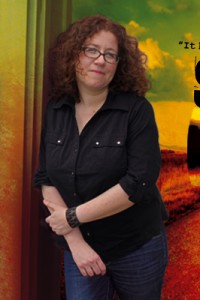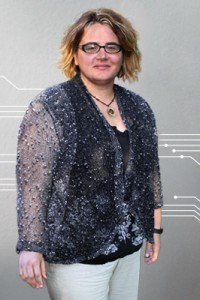Sofia Samatar: Stranger Scripts
 Sofia Samatar was born on October 24, 1971 in Indiana and lived in Tanzania, London, New Jersey, and Pennsylvania. Her father is from Somalia, and her mother is a Mennonite from North Dakota; she attended a Mennonite high school, and went to Goshen College in Indiana, also a Mennonite institution. She attended graduate school at the University of Wisconsin-Madison, studying African languages and literature. After getting her Master’s, she married writer Keith Miller and moved to Sudan (now South Sudan) to teach English for three years. They then relocated to Egypt, where they also taught English. They lived in Egypt for nine years before returning to the US, where Samatar studied Arabic literature in Madison, where she recently completed her PhD. This fall she will begin teaching literature at California State University, Channel Islands.Samatar’s debut novel A Stranger in Olondria appeared in 2013. She began publishing short fiction in 2012, and so far her stories have appeared inStrange Horizons, Clarkesworld, and Apex, among others. She also publishes poetry and book reviews.
Sofia Samatar was born on October 24, 1971 in Indiana and lived in Tanzania, London, New Jersey, and Pennsylvania. Her father is from Somalia, and her mother is a Mennonite from North Dakota; she attended a Mennonite high school, and went to Goshen College in Indiana, also a Mennonite institution. She attended graduate school at the University of Wisconsin-Madison, studying African languages and literature. After getting her Master’s, she married writer Keith Miller and moved to Sudan (now South Sudan) to teach English for three years. They then relocated to Egypt, where they also taught English. They lived in Egypt for nine years before returning to the US, where Samatar studied Arabic literature in Madison, where she recently completed her PhD. This fall she will begin teaching literature at California State University, Channel Islands.Samatar’s debut novel A Stranger in Olondria appeared in 2013. She began publishing short fiction in 2012, and so far her stories have appeared inStrange Horizons, Clarkesworld, and Apex, among others. She also publishes poetry and book reviews.‘‘My husband Keith Miller and I taught high school there for three years and then moved to Egypt. We actually wanted to go to Egypt first. Keith is American but grew up in Kenya, so we had East Africa in common: for him it was growing up there, for me it was my ethnic background. We’re both also very bookish. We like languages that have a lot of literature in them. Arabic was the obvious language to get interested in, and we wanted to go somewhere where people spoke Arabic, so Egypt was the obvious choice.
‘‘We wanted to go to Egypt, but when we were looking for jobs, this opportunity in Sudan came up. Keith had worked in northern Sudan before we got married, and he pointed out that because of the war, southern Sudan was a part of the world you couldn’t get to unless you had a reason to go there (like a job). We could go to Egypt on vacation, but we couldn’t see southern Sudan. He had worked in the north and really loved it, and he had a lot of southern Sudanese friends, and he’d always wanted to go to the south. To travel from north to south you had to go through Kenya, and we had different passports – it was like being spies because northern and southern Sudan were at war, and it was really complicated. After that we lived in Egypt for nine years. I taught English as a second language all those years, then decided, okay, now I’m ready to do the academic thing, and returned to Madison to get my PhD. I’ve loved it.
 ‘‘I’ve always been a writer. I’m not trained, so I taught myself to write by writing A Stranger in Olondria. It was a hot mess when I wrote the first draft. That took me two years. I was writing longhand. It was 200,000 words, which is about twice as long as it is now. It didn’t need to be that long – it wasn’t like beautiful things were lost! I spent the next 10 years revising it, on and off. I wrote a sequel, which is also a mess, that I’m trying to revise now. I didn’t imagine the books as a long series, but I did imagine two Olondria books.
‘‘I’ve always been a writer. I’m not trained, so I taught myself to write by writing A Stranger in Olondria. It was a hot mess when I wrote the first draft. That took me two years. I was writing longhand. It was 200,000 words, which is about twice as long as it is now. It didn’t need to be that long – it wasn’t like beautiful things were lost! I spent the next 10 years revising it, on and off. I wrote a sequel, which is also a mess, that I’m trying to revise now. I didn’t imagine the books as a long series, but I did imagine two Olondria books.
‘‘When I came back to the University of Wisconsin-Madison, I went to the convention WisCon for the first time. I’d never been to a convention before. I knew that I loved Small Beer Press – loved their books, I love everything they do, everything Kelly Link does ever. But I had published nothing, no short stories, nothing. I went to the Small Beer table and I met Gavin Grant and said, ‘I wrote this book.’ He said, ‘What’s it about?’ And I said, ‘Well, you know, it’s about somebody who leaves home and then he’s haunted by a ghost.’ He didn’t seem enthusiastic about my description at all! But he said, ‘Send me three chapters.’ So I did, and he said, ‘Can you send us the whole thing?’ Then he said, ‘We love it and we want to publish it.’ Best e-mail ever.
…
‘‘I read constantly. I discovered Proust while I was in Sudan. That was incredible, and possibly not the best thing for a young writer – it may be the reason the first draft was so overwritten! I was reading the poetry of Rilke, too. The whole idea of the angel as ghostliness and terror and beauty and pursuit, something that’s in pursuit of you, which is so important in A Stranger in Olondria, actually comes from Stephen Mitchell’s critical introduction to his translations of Rilke’s poetry. I wasn’t reading much genre fiction at all, though I’ve always loved Mervyn Peake, and Tolkien is an influence definitely in terms of maps and language and those epic fantasy things, and Ursula Le Guin, especially The Tombs of Atuan – I’ve loved it since I was a kid. Those were all there. But I read Proust’s In Search of Lost Time twice when I was in Sudan. The first volume, I don’t know how many times I read it. I also read the Brontë sisters, and I read Dracula for the first time when I was in Sudan. There’s Carole Maso, I adore her and her book AVA, it’s almost like a narrative poem. She’s a big influence. Cormac McCarthy. Michael Ondaatje. These are the people I was reading over and over while writing the book. I was also influenced by my favorites from high school: Woolf, Hemingway, Joyce, Faulkner, all of those.”
…
‘‘I’m starting a job in the fall at California State University Channel Islands, which is in Camarillo, north of LA. They want somebody who can do world lit, and I can do African Lit, and teach Arabic for them as well, and Arabic literature in translation. It’s interesting because when I went on the job market, I asked people, does the novel go on the CV? They said, ‘No, no, no, don’t let anybody know you write. Hide, hide, hide. Strange Horizons, who are you kidding? These are research universities, they don’t want to hear that!’ But with this particular school, they’re really into the interdisciplinary thing, and I thought they wouldn’t mind some crossover between academic and creative work. So I mentioned the creative writing stuff when I applied, and obviously it didn’t put them off, because they hired me. I’m happy I’m not starting a job and having to hide a huge part of my life. I was really excited to take this job – this is the one I want.”



 Excerpts from the interview:
Excerpts from the interview:



Congratulations, Sophia, on both the book and the job. I look forward to reading the book. Your specialty in Arabic Literature is the right one for today. I appreciate the autobiographical statement above, which fills me in on your years since Goshen College. Greetings to Keith, too. Another Mennonite/s Writing conference is being planned for Fresno, in your back yard, in 2 years or so. I hope you will join the festival.
Congratulations, Sophia!! I’m so grateful that I read this entire piece about your book, your travels, your living in so many different countries and studies. Wow, you have done a lot. I think I will like to ready your book! Again, congratulations on your Ph.D., your writing accomplishments and your new job.
I am grateful that someone I know has actually studied Arabic! How old are your children? I hear about you more often through Harold than Lydia or Saiid. I am working very much on my life story and I got a new computer. I find that my Amish background was very good for Somalia. I am sure that is true for both of you! Peace to both of you! Hadiya Hassan
Delighted to hear from you, Sophia, and to congratulate you on the book and the job. Your write-by-writing, and by reading, strategy makes good sense, especially in light of your enriched life resources. John and Pauline